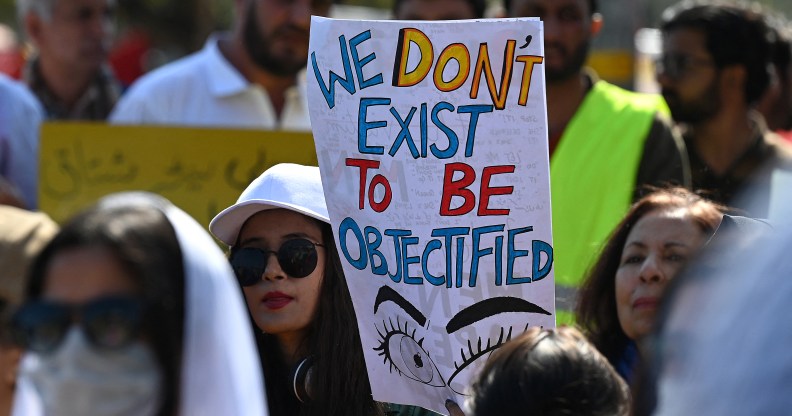Thousands of people march for trans and women’s rights in Pakistan

Thousands gathered at the march. (Getty)
Thousands of protestors have marched for trans and women’s rights across Pakistan’s major cities, including Islamabad, Lahore, Karachi and Multan.
On 8 March, the advocates gathered together in their masses for International Women’s Day to promote gender equality, safety against gender-based violence, and to denounce sexist norms in the country.
Aurat March, an independent collective, organised the rallies and spoke out against the discrimination and inequality faced by women and the trans community alike, where being a member of the LGBTQ+ community still carries the death penalty.
Those in the march this year highlighted the ongoing war on Gaza, where over 25,000 women and children have died in the conflict with Israel. They also advocated for women’s right to walk home safely and occupy public spaces without fear of harassment.
In Lahore, students, trans people, women factory workers, senior women activists who have been at the forefront of advancing women’s rights in Pakistan — which saw anti-rape laws being passed in 2021 — all rallied together at the march. Manifestos were handed out to onlookers, along with various performances taking place along the route.
There were also local art installations which were launched on the day, including a street harassment tunnel which features catcalling phrases that women and LGBTQ+ are often subjected to. Organisers urged locals to “ask any woman or khawja sira (trans, non-binary and gender non-conforming people) what they feel when they are out, and each one will have a story”.
“Take a walk in our shoes,” the installation urges. “Leave the tunnel with questions and discomfort. See where that takes you.”
This year, the organisation held a feminist press conference in advance of the march. They ensured the event would be an inclusive and safe space for women and those in the LGBTQ+ community to discuss the march by disallowing Cisgender men members of the media from attending.
Reports suggested that in previous years, Aurat March were hounded by Cisgender men journalists who were unwilling to share the floor with their women and trans counterparts.
Michelle Chaudary, President of the Cecil & Iris Chaudhry Foundation told Global Voices: “For years, women and girls from Hindu and Christian communities have been victims of forced conversion, and we appreciate that the Aurat March has addressed this issue on such a large scale.”

